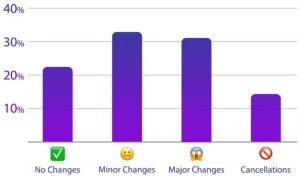Without a doubt, social media has forever changed the way we communicate. Whether we feel like sharing memes with our friends, or broadcasting our opinions to the world, many of us do so by posting to social media.
Social media provides any of us with the ability to share our words and thoughts instantly. A few keystrokes and BAM – our words are online…possibly for forever. We leave our digital footprints everywhere. This alone provides us with a good reason to always think ahead before we post, especially when sharing posts with potentially negative or offensive sentiments.
Even with that said, we have all still probably experienced regret at one time or another after posting to social media. Many of us have done the following:
- Posted something from the wrong account (business vs personal),
- Accidentally used bad grammar or misspellings in a post, or
- Shared something online which, after more careful scrutiny, we realized could have been considered offensive.
Plus, you may already know this, but it bears repeating…just in case. Know that even though you may think you are deleting something you have published anywhere online, it does not necessarily mean your post is permanently deleted from the Web.
When posting to social media goes wrong…
And herein lies the rub. In the United States, we have what is known as “freedom of speech,” which is protected by the First Amendment to the US Constitution.
As stated in Wikipedia,
Freedom of speech is the political right to communicate one’s opinions and ideas. The term freedom of expression is sometimes used synonymously, but includes any act of seeking, receiving and imparting information or ideas, regardless of the medium used.
Needless to say, many people test the limits of this freedom on a daily basis. Throw social media into the mix and the lines between “free speech” and “poor choices” become blurred all too often.
Take one of the most recent public occurrences of someone using poor judgement when posting online. In this case, the head of digital communications for the Houston Rockets gained notoriety – and lost his job – over a single tweet. In hopes of being “edgy” as a way of stirring up engagement with the accounts fans, Chad Shanks perhaps went a little too far.
In an interview he gave after his firing, Shanks even agrees he should have resisted that ill-fated tweet:
“I know several other teams’ social media managers and we would discuss ways we can interact when we’re playing each other because the fans love when teams go back-and-forth. Some posts were carefully planned out, a lot are spur of the moment impulses based on what’s happening in the game. I had an impulse toward the end of the game last night and should’ve resisted it.”
Source: PRNewser
So maybe we sometimes have more influence than we realize?
Most of us keep our social media posts within our own circles of influence. We can easily protect ourselves from outside “trolling” – or worse – by adjusting our privacy settings. Most of the major social media platforms have this option, and it’s worth looking into if you want to protect your privacy.
Even those people who truly are influential in the world, such as politicians and celebrities, probably enjoy posting to social media for only their friends and family to see. At least they have to option to do so…and sometimes we may think that many of them should keep more of their posts to themselves.
But even as a “regular” person, you never know who is reading your posts or who you may be influencing. In fact, I am nowhere near famous – but I can personally attest to losing a job as a result of a blog post I wrote and posted a few years ago.
I knew at the time that the words I had written about my employer were unkind (and possibly unfair); but I also felt I was justified in expressing my anger. However, writing when angry sometimes impairs a person’s judgement. In my case, it resulted in making a poor choice.
My worst “offense” though was assuming that no one in the company would ever see or read that post. Why? Well, because I wrote this post for my personal blog and on my own time. Well, needless to say, I was wrong about no one noticing. Someone did find that post…and I found myself terminated from the company.
Did I learn my lesson? Oh, you bet I did.
How we can save ourselves from making poor choices when posting to social media…
Put freedom of speech and the right to express ourselves aside. We can all take personal responsibility for what we’re adding to the already polluted internet. As we post for ourselves or for our businesses, we should take a few seconds (at least) and think before posting to social media.
Cara Joyner shares 5 excellent questions in her article for Relevant Magazine. By asking and answering these questions, you will help yourself make better choices when you post online:
- Am I seeking approval?
- Am I boasting?
- Am I discontent?
- Is this a moment to protect?
- Is it kind?
Over to you
Have you ever posted something online that you have ended up regretting? How did you handle it? What is your advice for those who may not think before they post?
I’d love to hear your suggestions. Please feel free to leave a comment below!
(194)







